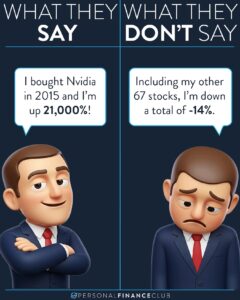
People get mad at me whenever I mention renting or buying. I’ll say something like “In addition to the mortgage payment, there are costs associated with owning a home.” And people say “YOU’RE AN IDIOT, RENTING ISN’T BETTER!!!!” Well, I didn’t say renting was better. But I can’t really contest the idiot thing. I mean, how does someone know if they themself is an idiot?!
But this whole rent vs buy thing really misses the point. Too often it’s looked at it in a vacuum. “If you live in the same home for 30 years you’re better off buying that home then renting that exact home.” Well, yeah. Of course. But guess what. That’s not how real life works. Here’s how real life usually goes: You’re living in an apartment, paying pretty cheap rent. And you’re sick of “throwing your money away on rent” so you buy a house. A WAY BIGGER AND NICER HOUSE than the apartment you were renting since, “it’s an investment.”
Well GUESS WHAT: When you upgrade from a modest apartment to a big house the whole “rent vs buy” debate goes out the window. Because the associated expenses (insurance, taxes, maintenance, realtor fees, etc) go up relative to the size and value of the house!
The inverse is true too. If you’re renting a luxury apartment paying top dollar for all the amenities, you’ll be way better off buying a modest home! The reduction in costs makes a way bigger difference than the small portion of your monthly housing expenses that actually goes towards the principle on your home (usually around 20% for most homeowners… 80% is a “thrown away”)
So stop worrying about whether you should rent or buy, worry about WHAT you’re renting or buying. Either way, keep it below your means so you can put more of your income into an actual investment (like index funds or investment real estate)!
As always, reminding you to build wealth by following the two PFC rules: 1.) Live below your means and 2.) Invest early and often.
-Jeremy

 September Sale!
September Sale! 



